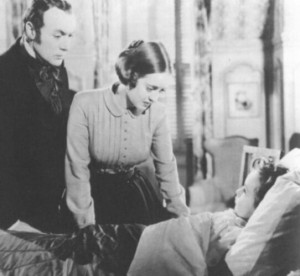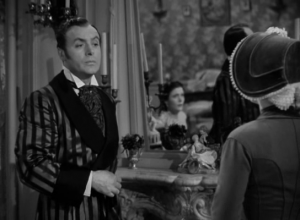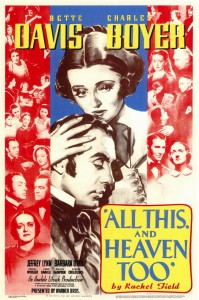 The great Bette Davis reached her first peak as an actress between 1938 and 1942, during which she was nominated for four Oscar nominations, and won one Award, for Jezebel; Davis’ first Best Actress Oscar was in 1935 for “Dangerous.”
The great Bette Davis reached her first peak as an actress between 1938 and 1942, during which she was nominated for four Oscar nominations, and won one Award, for Jezebel; Davis’ first Best Actress Oscar was in 1935 for “Dangerous.”Most of these films were melodramas, or weepies, as they were then called, films targeted at women, hence the pejorative label “women’s pictures (what we now describe as chick flicks).
Based on the best-selling novel by Rachel Lyman Field, adapted to the screen by Casey Robinson, Anatole Litvak’s melodrama, All This and Heaven Too, is a nineteenth century tale of unrequited love.
Davis plays Mademoiselle Henriette Deluzy-Desportes, a French teacher at an American girls school. Confronted by a student with gossip about her past, she decides to tell them her life story.
A governess to the four children of the Duc de Praslin (Charles Boyer) and the Duchesse de Praslin (Barbara O’Neil) in Paris during the end of the Orleans regime. The Duchesse’s erratic behavior leads to unhappy marriage, but the Duc remains loyal for sake of their children.
Through her selfless kindness, the governess wins the love of the children and their father, but also incurs the jealous hatred of their mother. She is forced to leave and the Duchess refuses to give her a letter of recommendation to future employers. The Duc confronts his wife and she invents alternate letters taking opposite attitudes. Her account enrages him and leads to her murder.
The Duc de Praslin is in a privileged position–his case can only be heard by other nobles. Initially, he refuses to confess his guilt or admit his love for Henriette–a way to protect her as she is under suspicion of complicity in the murder. Ultimately the Duc takes poison to prevent himself confessing the truth to the authorities; however, he lives long enough to reveal it to his servant Pierre (Harry Davenport), a kind man who had warned the governess to escape the de Praslin household. She is released by the authorities.
Henriette’s French class is moved by her account. She had been recommended for the teaching position “in the land of the free” by an American minister, Henry Field (Jeffrey Lynn), to whom she had expressed a loss of faith while in prison. In the end, Field visits her in prison, in an effort to restore her faith and declare his love and friendship.
 Litvak treats the material with taste and restraint, and he gets good and subtle performances from the leads, as well as from the secondary actors, particularly Barbara O’Neil, as the Duke’s possessive and neurotic wife.
Litvak treats the material with taste and restraint, and he gets good and subtle performances from the leads, as well as from the secondary actors, particularly Barbara O’Neil, as the Duke’s possessive and neurotic wife.
All the staples of a lavishly produced Warner melodrama are in evidence, from the lavish cinematography of Ernest Haller to the reliably moody score from Max Steiner, and lush costumes from Orry-Kelly.
Read about Bette Davis greatest performance ever in the 1950s Best Picture Oscar winner, All About Eve.
https://emanuellevy.com/review/oscar-history-best-picture-all-about-eve-1950-2/
End Note:
Though Barbara O’Neill received a Supporting Actress Oscar nomination for this picture, she is still best known for playing Scarlett O’Hara’s mother in “Gone with the Wind,” made the year before.
Oscar Nominations: 3
Picture, produced by Jack L. Warner and Hal B. Wallis, with David Lewis
Supporting Actress: Barbara O’Neil
Cinematography (b/w): Ernest Haller
Oscar Awards: None
Oscar Context
In 1940, the Best Picture Oscar went to Hitchcock’s first American movie, the gothic romance “Rebecca,” which also won the Cinematography award for George Barnes.
Better known as Scarlett O’Hara’s mother in “Gone With the Wind,” Barbara O’Neil lost the Supporting Actress Oscar to Jane Darwell in John Ford’s Depression-era drama, “The Grapes of Wrath,” starring Henry Fonda.
Cast:
Henriette Deluzy Desportes (Bette Davis)
Duke De Praslin (Charles Boyer)
Reverend Henry Field (Jeffrey Lynn)
Duchesse De Praslin (Barabra O’Neill)
Louise (Virginia Weidler)
Pasquier (Walter Hampden)
Pierre (Harry Davenport)
Abbe Gallard (Fritz Leiber)
Madame Le Maire (Helen Westley)
Mademoiselle Maillard (Sibyl Harris)
Credits
Produced by David Lewis
Directed by Anatole Litvak.
Screenplay: Casey Robinson, based on the novel by Rachel Lyman Field.
Camera: Ernest Haller.
Editor: Warren Low.
Music: Max Steiner.
Art Direction: Carl Jules Weyl.
Costumes: Orry-Kelly.





Speak Your Mind